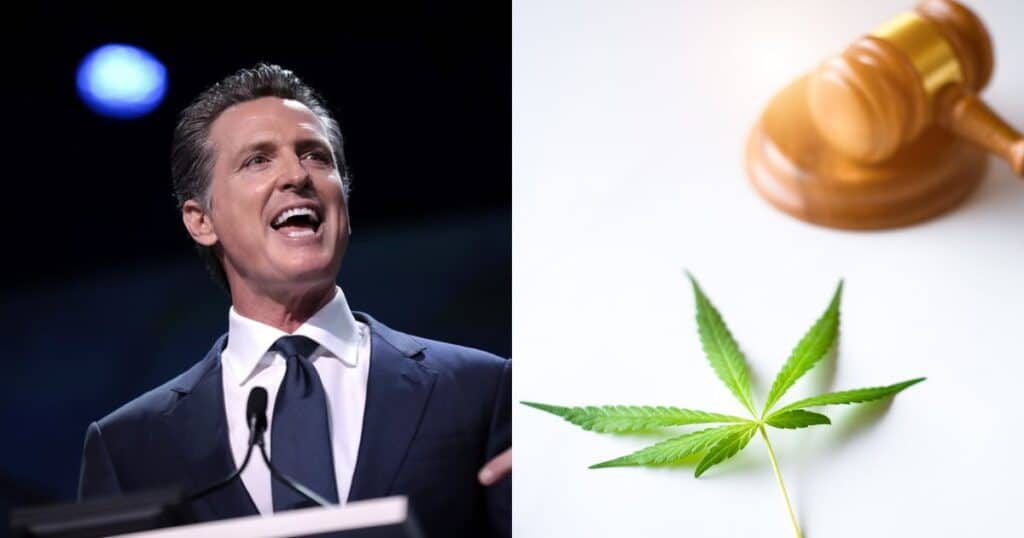Governor Gavin Newsom signed Assembly Bill 1775 into law Monday, paving the way for Amsterdam-style cannabis cafes where consumers can enjoy non-cannabis-infused food and drinks while consuming cannabis on-site. However, the political motivations behind passing AB 1775 have raised eyebrows, especially since Newsom vetoed AB 1111 on Sunday, a bill aimed at providing much-needed support to small cannabis farmers.
What is AB 1775?
Assembly Bill 1775, authored by Assemblyman Matt Haney, allows local governments to permit cannabis retailers to sell food, drinks, and even tickets to live events hosted at their stores. This means that customers will no longer have to choose between enjoying their cannabis and getting a bite to eat, much like the famous cafes in Amsterdam. The law takes effect on January 1, 2025, but the cafes will only be allowed where local jurisdictions approve them.
Before AB 1775, California dispensaries could sell prepackaged snacks and drinks and allow customers to consume cannabis on-site. The new law goes a step further by permitting the preparation and sale of hot food and nonalcoholic beverages.
This creates a more inviting atmosphere for cannabis consumers and helps integrate cannabis into daily life in a manner similar to bars and cafes. The bill aims to create a more social experience and help grow California’s cannabis culture and industry.
Governor Newsom initially vetoed a similar bill in 2023 due to concerns about secondhand smoke and the health and safety of cafe workers. The revised bill includes additional safeguards, such as allowing employees to wear respiration masks at the employer’s expense and requiring guidance on the risks of secondhand cannabis smoke.
Opposition to AB 1775
Despite the enthusiasm for cannabis cafes, there is significant opposition. Organizations like the American Cancer Society Cancer Action Network argue that the new law undermines existing smoke-free regulations and threatens public health.
“AB 1775 violates Proposition 64 (the 2016 California ballot measure that legalized recreational marijuana in the state), which explicitly states that smoking marijuana is prohibited wherever smoking tobacco is prohibited,” said American Cancer Society Cancer Action Network managing director Jim Knox via The Sacramento Bee.
“It also undermines the state’s smoke-free restaurants law and compromises its enforcement, thus threatening to roll back decades of hard-won protections of everyone’s right to breathe clean, smoke-free air.”
Controversial Veto of AB 1111
During the same week that Governor Newsom signed AB 1775 into law, he also vetoed AB 1111. This bill aimed to create cannabis farmer markets for small California farmers, providing some relief in a heavily regulated market.
The veto has sparked controversy, with many accusing Newsom of favoring celebrity-backed cannabis businesses over struggling small farmers. Celebrities like Whoopi Goldberg, Woody Harrelson, and Bill Maher, who own cannabis businesses in California, publicly supported AB 1775 calling for Newsome to sign it into law.
“It makes no sense that we don’t let cannabis lounges sell food. Right now, California makes it harder to get high at a lounge and eat a sandwich than to drive a car, but guess which one is more dangerous?” said Maher, in a press release last week. “Governor Newsom needs to show that California supports small legal businesses by signing this bill.
Bill Maher’s statement highlights a glaring contradiction in Governor Newsom’s recent actions regarding California’s cannabis industry. While Maher urged Newsom to demonstrate support for small, legal cannabis businesses by enacting AB 1775, the governor’s simultaneous veto of AB 1111 seems at odds with the notion of fostering small enterprises.
Political Pandering?
AB 1111 specifically addressed the challenges small cannabis farmers face, providing them with a crucial avenue to operate in a highly regulated environment. The decision to veto the bill has drawn criticism, as it appears to privilege well-funded, celebrity-endorsed cannabis ventures over local small businesses that are vital to the industry’s grassroots foundation.
Such a move seems contradictory to Maher’s call for action and raises questions about the state’s commitment to genuinely supporting all levels of its cannabis market.
The simultaneous signing of AB 1775 and the veto of AB 1111 raises questions about Newsom’s political motives. Critics argue that the governor prioritizes the interests of wealthy celebrities who can offer financial support over small farmers who lack the means to contribute to political campaigns.
The veto of AB 1111 has left many small cannabis farmers feeling neglected. These farmers have long struggled with high taxation, restrictive regulations, and competition from the illicit market. By vetoing a bill meant to provide relief, it appears that Newsom is prioritizing the interests of well-funded, established businesses over the needs of small farmers.
Featured Image Of Gavin Newsom from Gage Skidmore on Flickr, Edits Made.

















